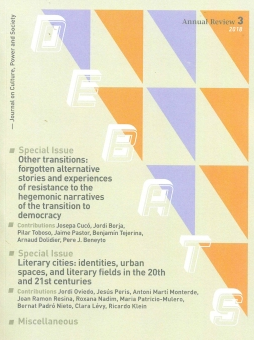Transitions, illusions, frustrations, and hopes
Resumen
Francoism was a brutal dictatorship, but it was not always that way. During the 1940s and 1950s, people in Spain lived under a dictatorship like that of other fascist dictatorships, in a civil war atmosphere of repression and terror. Society lived in fear and/or submission; resistant minorities were heroic, but they did not change the political regime. In the 1970s, some segments of society gradually began to lose their fear; the Spanish state no longer controlled social or daily life regarding the use of language; the fight of the trade unions grew despite State repression; universities and cultural spheres despised Francoism and, by the end of the decade, social demands and protests emerged in working-class neighbourhoods. In this context, the political cores—most of the left as well as nationalists—began to take root in the most critical areas of the regime and an ‘agreed transition’ became almost inevitable. Most of society did not want the Franco regime to continue, but they also feared a traumatic and violent change. The result was a formal democratic beginning. However, institutional Francoism was still present, for example, in the armed forces, the upper echelons of bureaucracy, and the Judiciary. Transition was the beginning of democratisationDescargas
Descargas
Publicado
Cómo citar
Número
Sección
Licencia
Sin perjuicio de lo dispuesto en el artículo 52 de la Ley 22/1987 de 11 de noviembre de Propiedad Intelectual, BOE del 17 de noviembre de 1987, y conforme al mismo, los autores o autoras ceden a título gratuito sus derechos de edición, publicación, distribución y venta sobre el artículo, para que sea publicado en Debats. Revista de cultura, poder y sociedad.
Debats. Revista de cultura, poder y sociedad se publica bajo el sistema de licencias Creative Commons según la modalidad «Reconocimiento - NoComercial (by-nc): Se permite la generación de obras derivadas siempre que no se haga un uso comercial. Tampoco se puede utilizar la obra original con finalidades comerciales».
Así, cuando el autor o autora envía su colaboración, acepta explícitamente esta cesión de derechos de edición y de publicación. Igualmente autoriza a Debats. Revista de cultura, poder y sociedad, la inclusión de su trabajo en un fascículo de la revista para que se pueda distribuir y vender.











